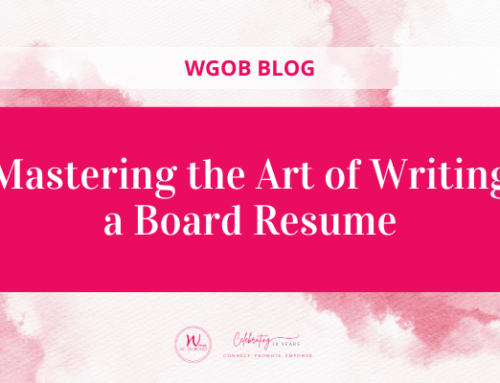Women Get On Board Inc. (WGOB) is a member-based company that connects, promotes and empowers women to corporate boards. On September 14th, we held our virtual WGOB Virtual Speaker Series sponsored by the Canada Climate Law Initiative (CCLI).
This virtual event featured a panel discussion about how to get climate change on the board agenda. Directors are increasingly aware that policymakers and regulators view the management of climate-related financial risks as a core business issue. The question is how to get the board’s attention on these issues, given the rapidly developing dangers of climate change.
Deborah Rosati, FCPA, FCA, ICD.D, Corporate Director, Founder, and CEO of WGOB, kicked off the event with a warm welcome and introduced the moderator, Liane Langstaff. Liane is an environmental lawyer in Gowling WLG’s Toronto office, practicing in the areas of environmental litigation, environmental assessments and climate change.
“Human influence has warmed the atmosphere at an unprecedented rate. No part of the world is exempt, and we saw this first hand with the Western Canada forest fires this summer. There is a substantial risk to humanity and global economies,” said Liane. “But what does all this mean for the board of directors? How do we move from this high-level science and macroeconomic theory to affecting change at the board level?”
Liane introduced the panellists:
- Poonam Puri, Professor of Law, Osgoode Hall Law School
- Christie Stephenson, Executive Director, Executive Director, Dhillon Centre for Business Ethics
- Janis Sarra, Professor of Law, Peter A. Allard School of Law
First, panellists were asked to identify the main barriers to getting climate change on the board agenda.
“Boards these days are expected to tackle many issues, but climate change is getting on the agenda,” said Christie. “The problem is these issues require literacy and expertise. Directors need to make sure they are getting the training and education they need to govern effectively on climate change.”
Janis agreed that educating directors is the first and most crucial step. “Directors need to make the connection between the climate events that we are witnessing and what it means for the company’s bottom line,” said Janis.
Liane asked the panellists how directors should start educating themselves and raising issues at the board level.
“CCLI has developed guides to help directors, one for audit committees and one for the insurance sector,” said Janis. “While developing these guides, we’ve learned that once you have a general understanding of the tools available, it’s important to drill down in a way that allows the board to have a meaningful conversation.”
For example, Christie pointed out that forming a dedicated ESG committee ensures that multiple directors are committed to driving forward climate change policies and strategies. Poonam added that all board directors should engage in a professional development session to ensure board-wide familiarity with climate change risks.
Liane asked Poonam what she thinks the impact of the Task Force on Climate-Related Financial Disclosures (TCFD) will be for boards.
“It’s a great framework for companies to make disclosures about climate risk, and it gives a roadmap for companies that don’t know where to start. What has the result been? First, lots of companies around the world support the framework. Also, the federal government has committed to engaging with provinces and territories to make climate disclosures,” said Poonam.
Christie agreed with Poonam, adding that TCFD has shown companies that climate discussions are high-level, strategic business drivers—not just operational minutiae.
Midway through the session, Liane pointed out that while climate change comes with lots of doom and gloom, there is also room for boards to identify positive opportunities.
“It’s important to reframe climate change conversations,” said Poonam. “There are huge opportunities in terms of cleantech, green buildings and renewables. In the financial sector, we’ve been thinking about green products that consumers need and want.”
Christie said that capital is flowing toward green, climate-friendly solutions. This means that there are opportunities for enormous innovation and economic transactions.
“One of the opportunities that we need to discuss is how can we tie corporate climate conversations to Indigenous reconciliation?” said Christie.
Liane opened the session to a question-and-answer period from the audience. The first question was how should companies decide which framework disclosure to use, given that there are now multiple models available.
Janis said that it’s important to remember that there is a convergence among the frameworks. Over time, she thinks there will be a push for a universal framework. In the meantime, consult your accountant and audit committees.
Next, panellists were asked if climate change responsibilities should be mandated at the board or corporate level?
Janis said that over time, the shift to mandatory climate action plans might well occur. However, investors should also help companies and boards prioritize these actions.
“ESG investors are playing an active role in standards-setting,” added Christie.
Poonam pointed out that a great example of investors influencing change is the ExxonMobil shareholder activism that occurred earlier this year. As a result, shareholders unseated two board members and replaced them with directors who prioritized climate change.
Deborah, WGOB’s Founder & CEO, wrapped up the lively session.
“This hour flew by thanks to your energy and your insights. Your commitment to making change is critical on our path to tackle climate change,” said Deborah. “Thank you, Liane, Poonam, Christie and Janis!”
Are you interested in learning more about effective boards and governance? Join us for our next virtual event on October 5th called “Elevating your Board Effectiveness,” sponsored by BMO. Register here.






